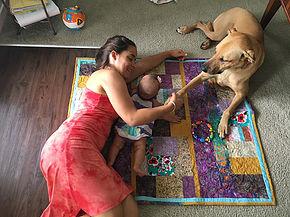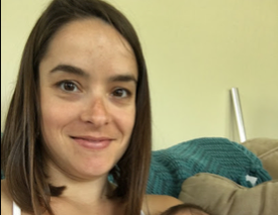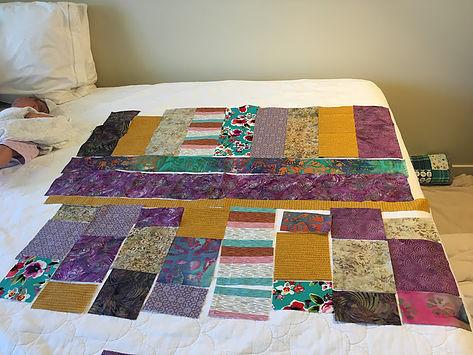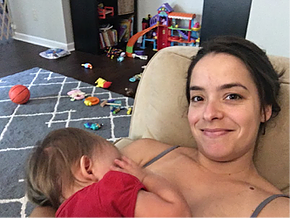
#MilitaryMonday: Postpartum Depression, Putting the Pieces Back Together
Recently I went to a local Modern Quilt Guild’s meeting. It was a “sit’n’sew” meeting, meaning women can sew together for 5 hours, with no other distractions. Boy, did I love the sound of that, just me, my sewing machine, and new quilting friends. As I sat and listened at the beginning of the meeting, my mind couldn’t help but travel back to my very first quilt guild meeting under much different circumstances.
I felt like my life was falling apart. My daughter was a few months old and I had never been more afraid and confused in my life. See this picture?
You may not see my fear, but oh, it is there. I wanted to appear happy in the pictures taken in those early days for my daughter so she never had to know my pain, our pain as a family. Fear, pain, gloom, sadness, emptiness, numbness, anger, frustration, desperation were all emotions I experienced for weeks on end starting around week four postpartum. I expected some emotional messiness as a first time Mama but nothing like this! Rather quickly, every day became an emotional nightmare. Was it the “baby blues”? I spoke to my doctor and kept her updated on my mental state and we agreed that I should keep up my normal coping, continue getting out of the house, etc. We agreed to talk more at my baby’s six-week appointment if I didn’t need to talk before. By that point though, I knew I was experiencing one of the most common postpartum complications: postpartum depression/anxiety.
My husband had been gone a few weeks in those early days for work. Although I tried to tell him that I felt something was wrong, he wasn’t fully aware of how I felt. Once home, he came with me to our daughter’s six week appointment where I was diagnosed with PPD. What a horrific day---all tears! It took every bit of courage I had to not fall apart in the waiting room taking the PPD inventory. As soon as my OB walked into our room, I broke down, hard! I told her exactly how I felt and what I was thinking. The most common course of treatment for the quickest recovery is counseling and medical intervention, use of an antidepressant. “What?!” I thought, “You’re telling me that I am depressed, that I can’t snap out of this?” I never really struggled with feeling out of control; if I went through a difficult experience, I could successfully rely on my typical coping strategies (exercise, spending time outdoors, talking with family/friends) to work through it. I thought, “And now I need ZOLOFT?”
I worried what people were going to say. Would they judge me or make fun of me? Would I become addicted and be on it forever? Somehow, I convinced myself that evening that the Zoloft would be temporary, despite my fear and anxiety surrounding it. That day was a blur, but I do remember that I went with a friend to the clinic and picked up my prescription, hoping no one could hear or see what they were handing me at the counter. I brought it home and told myself I wasn’t going to take it, being stubborn! I am trained in mental health and understand the medical benefits of medication, but somehow felt I didn’t fall into the group of people who need them. I had to get over my own bias against “happy pills”. I thought I was pretty open minded regarding mental health except depression. I used to think people experiencing depression could just “snap out of it” and that we are in charge of our own happiness. Those beliefs were debunked when a loved one told me to just “snap out of it”! I snapped back, “IF I COULD, DON’T YOU THINK I WOULD?!” That moment motivated me to begin my counseling journey with Zoloft as my sidekick.
It was not only for me but also for my family.
I had changed so drastically and quickly in those early days. I felt as if I were a stranger in my own body! I couldn’t recognize myself. I had no appetite which is so unlike the “foodie” that I typically am and unlike a breastfeeding mother. Nothing brought me joy-absolutely nothing! I couldn’t read, watch tv, take a bath, go on a run…..all I ever thought about was, “what’s wrong with me? Why would God allow us to experience this trauma? Will I ever feel normal again, like me? Will I ever be my old bubbly self and love life again?” I am a rather confident individual and don’t struggle to make little decisions—well to HELL with that! That’s one of PPD’s horrible symptoms- indecisiveness. I was so overwhelmed and worried about making little decisions as a new mom--I would discuss things with my husband and end up in tears over not knowing what to do about little things like using or not using a paci, picking a swaddle, what time to put her to bed, should I nurse her to sleep, should I use a cover in public, blah, blah, blah!
Being able to feed and nourish my daughter was the only thing I felt confident doing. I had faith in my body’s biological ability and was able to be in the moment when feeding her. I had to take my darkest days one nursing session at a time. Those feedings sometimes were the only times in the day where I felt a glimpse of hope. I know my daughter would nurse for a certain amount of time, she would need to be burped, and then would do it again in X amount of time. That was guaranteed and I was successful at it. The more she nursed, the stronger my confidence grew. Learning and reminding myself about how oxytocin works in bonding and forming attachment helped me in those dark, dark days.
Maybe one of my biggest struggles with PPD was struggling with the bond a mother is “supposed” to have with her child. No one tells expectant mothers that the bond may not be there right away; it isn’t necessarily a given. They may not have that beautiful moment they were expecting or that is portrayed in the media. When I didn’t feel that overwhelming love and joy and couldn’t identify how I felt, fear took over. I remember questioning why I ever wanted children; if I knew it would be like this, maybe I would have taken a different path. I was supposed to be in love with my baby! Stinkin’ PPD……all the symptoms hid that joy and love that had been there all along! I remember crying in a friend’s arms and looking at my daughter telling her, “I don’t “feel” the love baby girl but I KNOW I love you—it’s there somewhere! God, please let me show her! Please just let me feel the love!” Every time she needed to nurse, I dug into the couch or wherever I was and just fed her; I focused on the miracle that is breastfeeding and nourishing a tiny human being. Breastfeeding her created and held the space for my mind to connect love with my and her heart.
I continued treatment. I started to meet more Mamas, learned to quilt, and built my village. The more time I spent around other nursing Mamas (thanks Mom2Mom Scott!!) and breastfeeding friendly folks, the better I got. When your counselor refers to one boob as chocolate milk and the other as strawberry when you're nursing in a session, you can’t help but laugh and feel good! Having a mental health professional to come along with me on the medicine journey really helped me stick it out until I began seeing the light at the end of the tunnel.
About two months later, I was consistently having okay days, better days, having more times when I felt that I was back. And, finally, I was physically hungry again. I felt my belly growl and couldn’t wait to eat snacks and meals!! Hallelujah!! Pleasure in the little things had returned. I remember the first night that I put my baby to bed, got myself ready and relaxed, actually relaxed on the couch with a book. My mind wondered into the story on the pages I was reading and it was bliss!
Three things were key to helping me in my initial and long-term recovery:
- Appropriate medical and mental health treatment
- Quilting (I got the quilting bug from a friend whom I met just months before our daughter’s arrival)
- Breastfeeding my baby girl I don’t know which, if any, is the most important but I am certain that nursing my daughter saved me!
Fast forward to here, now…..these pictures!
I am back and feeling amazing. Feeling like myself again, not a stranger, I am a newer, stronger, braver and more vulnerable version of my former self! And that vulnerability doesn’t make me anxious-it inspires me. When I look in the mirror, I smile because I see me again and truly know who I am as a wife, daughter, sister, friend, and now a mother. I am regularly moved to tears when I look at my daughter because I feel that immense, indescribable, overwhelming, and beautiful love that only a parent can feel. I sat in the guild meeting reflecting on all of that with tears running down my face. This time, they were tears of joy, growth, love, happiness, accomplishment, and pride. It’s been a challenging journey and I can say with confidence that breastfeeding got me through it!
This post originally appeared on the Mom2Mom Global Blog.







The views and opinions expressed in this post are those of the author(s) and do not necessarily reflect those of MomsRising.org.
MomsRising.org strongly encourages our readers to post comments in response to blog posts. We value diversity of opinions and perspectives. Our goals for this space are to be educational, thought-provoking, and respectful. So we actively moderate comments and we reserve the right to edit or remove comments that undermine these goals. Thanks!